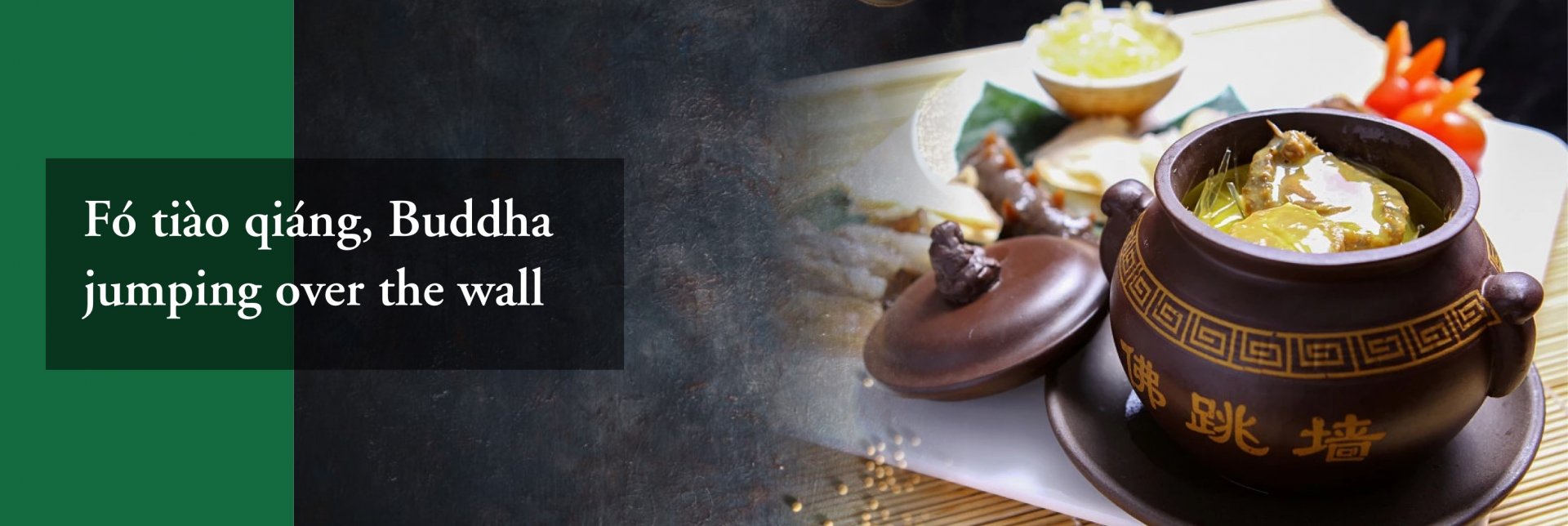Fó tiào qiáng, Buddha jumping over the wall: the most sincere and delicious dish in Chinese culture for more than 100 years!
Fó tiào qiáng --Steamed Abalone with Sharks Fin and Fish Maw in Broth (Lured by its delicious aroma even the Buddha jumped over the wall to eat this dish.)
"This year, I've prepared everyone's favorite dish, such as marinated pork feet, braised fish, and Fó tiào qiáng佛跳墙, Buddha jumping over the wall.” In Chinese culture, almost every family has these dishes for their New Year's Eve dinner, and among them, the "King of Fujian Cuisine", Buddha Jumping over the Wall, is the most important dish that always takes the center stage in this most exciting feast of the year.
Why Fó tiào qiáng could be revered as king among the Fujian Cuisine, surpassed such famous dishes asThree Cup Chicken三杯鸡 and Braised Pork with Preserved Vegetable梅菜扣肉?It is not only a matter of the abundance of seafood and delicacies in it, but also of the complicated preparation and cooking method, which is hardly surprising to take up to three days.
How did this elaborate dish first appear? Where did the interesting name "Fó tiào qiáng, Buddha Jumping over the Wall" come from? Let's take a trip back in time to the family of an official in Fuzhou during the Guangxu (光緒,1875-1908)period of the Qing Dynasty(1636-1912), where the meal that is said to be the origin of " Fó tiào qiáng" began!
More than 10 ingredients simmered to create an unforgettable taste, first named "Fu Shou Quan福寿全”, meaning “good fortune and longevity”
According to historical records, the local official system of the Qing Dynasty was that each province had a Governor General(總督) and Provincial Governor(巡抚), an inspector, to manage military and civil affairs, and down the line, there were " Commissioner for the Transmission of Edicts Administration (布政使)" to handle civil affairs and financial matters.
During the Guangxu period of the Qing Dynasty, an official of the Fuzhou Banking Bureau hosted a banquet at his home for the Chief of Secretary, Zhou Lian (周蓮,1848-1920). In order to ensure that the guest would enjoy the meal, the official naturally asked the chef to show the tricks up his sleeves. So, the chef put more than ten kinds of ingredients, such as chicken and duck, into the wine jar and stewed them for a long time, and invited Zhou Lian to try them at the banquet.
After tasting the dish, Zhou Lian admired it and asked the official the name of the dish. The official named the dish "Fu Shou Quan"(福壽全) with the meaning of "good fortune and longevity".
How did the name "Fó tiào qiáng, Buddha Jumping over the Wall" come about? In fact, Zhou Lian's chef, Cheng Chun Fat(鄭春發,1856-1930), improved the dish after the meal and later served it to important guests at a dinner party. The guests were equally amazed by the dish and improvised a poem on the spot: "The fragrance of the meat from the altar spread around the neighborhood, and the Buddha was so tempted by the smell that he abandoned Zen and jumped over the wall”( 壇啟葷香飄四鄰,佛聞棄禪跳牆來). Since then, people began to call this dish " Fó tiào qiáng, Buddha jumping over the wall".
The ingredients and prices getting more and more diversified, but the intention behind it remains the same
Passed down all the way from the Qing Dynasty to today, Fó tiào qiáng has always been a relatively expensive dish in South Fujian culture not only because it first appeared in the banquets of officials, but also because of the laborious preparation process. After preparing more than a dozen ingredients such as chicken, duck, shark's fin, abalone and pork belly, some have to be fried, some have to be soaked for a long time, and after all the ingredients are processed, they have to be stacked and stewed for a long time. Whether it's for a banquet or just for the family, this is the only way to create a good taste with "enough sincerity".
Because of the labor-intensive preparation, most people could only have chance to eat Fó tiào qiáng either in high-end hotels or at important meals such as New Year's Eve dinners. However, in recent years, the traditional positioning of Fó tiào qiáng as "delicacies of every kind from land and sea" and "expensive" is gradually weakening and going in the direction of more diverse ingredients at more affordable prices.
In Taiwan, in addition to the emergence of "vegetarian Fó tiào qiáng " made of mushrooms and vegetarian ingredients in response to the trend of vegetarian food, there are also "affordable Fó tiào qiáng ", with a bowl of only NT$80 (about HK$20).
However, no matter how many "variations" of Fó tiào qiáng there are in modern times, in Chinese culture, the efforts to make this bowl of soup have never been reduced, which is always "elegant" in an urn or a cup, and what has remained unchanged for more than a hundred years is the culinarian's supreme dedication to the ingredient selection, and also to the guests and families waiting to enjoy it at the table.
All articles/videos are prohibited from reproducing without the permission of the copyright holder.








Welcome to leave a message:
Please Sign In/Sign Up as a member and leave a message